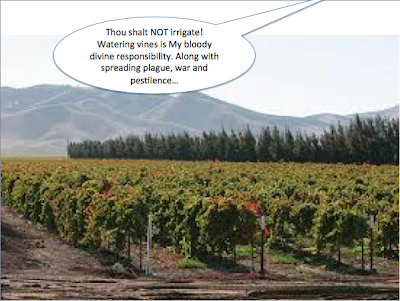Jonathan Hesford, of Domaine Treloar in Roussillon recently posted a Facebook comment on a Roussillon Chambre d'Agriculture paper which he described as "scary" because, among other things, it had the temerity to suggest that introducing irrigation might be a valid option for his region. He went on to say that if he thought that "by introducing irrigation they would be able to produce really popular wine to beat competition from the New World in Anglo-Saxon markets" he'd agree with its use, But he feared that " it will just be to produce more
boring wine".
Irrigation is forbidden in almost all of France's appellation regions
Would someone who thinks this makes sense please answer the following questions
- Why is irrigation wrong per se? (I'm assuming availability of water, from one's own dam for example).
- Why is God/nature the only being allowed to decide when a vineyard can get a drink?
- Why is making a vine suffer through a drought - and most probably stop growing - a good thing for wine quality?
- Why is delaying the harvest (by stopping the vine from growing during the middle of the season) until the time of greater risk of mid-vintage rains (which will dilute the wine) a good thing for wine quality?
- Why is it assumed that New World producers with access to water cannot and do not make great wine?
- Why is it presumed that French (and other European winemakers in AOC areas) cannot be trusted to use small amounts of water judiciously to go for quality rather than quantity?
- Why do we have imposed yield limits, if we're also banning irrigation?
- Why are those yield limits fixed per hectare rather than per vine (thus ludicrously allowing the same yield to a producer with 5k vines in his ha and one with 10k?)
- And finally, precisely how much good have existing AOC rules done for the quality and marketability of basic Bordeaux Rouge and Minervois, both of which are available on the bulk market for under €1.50/litre?
Just asking....
- Why is irrigation wrong per se? (I'm assuming availability of water, from one's own dam for example).
- Why is God/nature the only being allowed to decide when a vineyard can get a drink?
- Why is making a vine suffer through a drought - and most probably stop growing - a good thing for wine quality?
- Why is delaying the harvest (by stopping the vine from growing during the middle of the season) until the time of greater risk of mid-vintage rains (which will dilute the wine) a good thing for wine quality?
- Why is it assumed that New World producers with access to water cannot and do not make great wine?
- Why is it presumed that French (and other European winemakers in AOC areas) cannot be trusted to use small amounts of water judiciously to go for quality rather than quantity?
- Why do we have imposed yield limits, if we're also banning irrigation?
- Why are those yield limits fixed per hectare rather than per vine (thus ludicrously allowing the same yield to a producer with 5k vines in his ha and one with 10k?)
- And finally, precisely how much good have existing AOC rules done for the quality and marketability of basic Bordeaux Rouge and Minervois, both of which are available on the bulk market for under €1.50/litre?
Just asking....








No comments:
Post a Comment